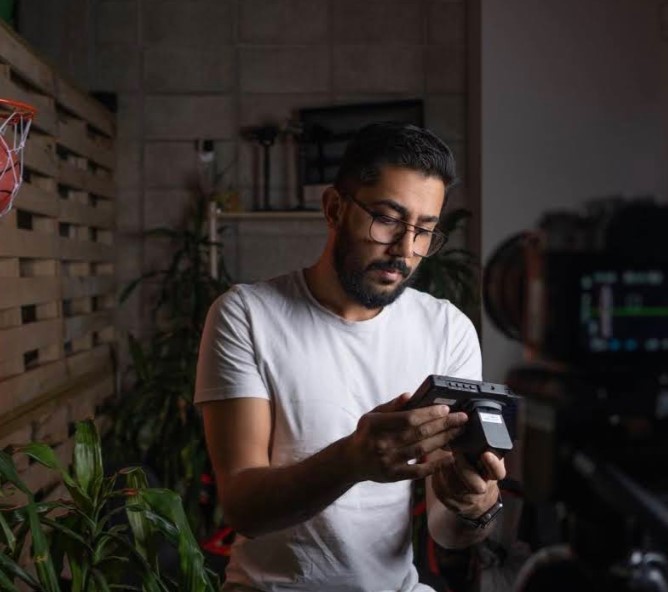(May 21, 2024) In January 2022, when Kaushik Kumar received a phone call from Forbes magazine, he thought it was a scam. They asked him to fill out a form, which he ignored, until he received an email. This time, he filled the form and didn’t hear anything after that, until he received a text message from a friend saying congratulations. He had made it to the coveted Forbes 30 Under 30 list for 2022 in Media, Marketing and Advertising. He runs two businesses – Dark Matter, which does content creation for businesses and Dark Spaces (which was featured on Forbes), a high-tech studio space that businesses and content creators can rent by the hour. “Someone somewhere had put in a nomination for me,” Kaushik tells Global Indian.
Empowering content creators
What’s special about a studio space? The world is full of content creators, hoping to be on Instagram and YouTube, all of whom learn very quickly that it’s very hard to do. It requires the right lighting, the right camera equipment and high-end microphones and most importantly, a space free of interruption and external sounds, which also has a pleasing backdrop. Kaushik had discovered this for himself when he and a friend decided to do a video a week for 52 weeks. He was working at a co-working space in those days and the two of them went location scouting to coffee shops and clubs. “Nothing was working,” he says. “You end up carrying all the gear with you and spend ages setting up, only to have people walking in and out. And you’re constantly on edge, worrying about who’s walking past or who is going to knock on the door.”

Kaushik Kumar
When he asked around, he found lots of people had similar issues. “At home, the background isn’t always the best, or the kids are going to make noise. Or, you dn’t have the best equipment and will end up with a video that’s not the best representation of the business.” Kaushik put out a question on social media, asking if people would be interested in a studio space they could rent and received a flood of responses immediately. That’s how Dark Matter started up in 2021, with two backdrops, a couple of lights and a cyclorama wall (a background device used to cover the back and sides of a stage, used with special lighting to create the ilusion of a much larger space, or of the sky).
“People come in, test it out and try the equipment,” says Kaushik. Aspiring content creators are also taught how to use the equipment in the room. “We might only see them a handful of times, they tend to go on and set up their own studios and offices. People come here to see how it works for them and if it’s worthwhile to go and invest in the equipment.” It was a huge gap in the middlemarket, Kaushik says, that he entered.
“People don’t have the equipment but they also want to do it themselves.” His other business, Dark Spaces, actually does content creation for businesses on a subscription model. “They come to us and sign up for a quarter at a time, so we create videos, audio, text, graphics and things to help them build authority and brand awareness. The more someone is seen and heard, the more likely you are to be perceived as an authority.”
Growing up in the sugarcane fields of Fiji
Kaushik Kumar was born in Fiji, as part of the Indian diaspora in the South Pacific islands. When he arrived for the interview, he was concerned that he might not fit the bill as an ‘Indian’, per se. His grandfather, Kaushik says, is the son of a girmitya – his greatgrandparents had arrived there on British ships. “My maternal grandfather is still a sugarcane farmer, even at the age of 75,” he smiles. His great grandparents had arrived in Fiji at the turn of the 20th century, part of a group of around a million, mostly uneducated Indians who sailed across the ‘kala paani’ or black waters, on the agreement (girmit, they pronounced it) of decent pay and a better life. They became known over the years as girmityas. They had been taken there to tend to the British-ruled plantations, to fill the shortage labour supply caused by the abolition of slavery. Many had no idea how far they were going, or that they would never return to their homelands again.

Kaushik Kumar
“A whole culture has evolved there,” Kaushik says. “We speak a dialect that is a mixture of North Indian and South Indian languages, Bihari and Nepali. Our accent is very different and the food is not what you would expect from India. But our connection to the country remains strong – even if we speak a different dialect, we follow Hinduism.” These Indo Fijians now make up 50 percent of the population, comprising Hindus, Muslims and Buddhists. “It’s all very Indian – you walk down the street and you will find Indian food, clothing and sweets.
Growing up there, Kaushik and his brother spent most of their time outdoors, playing with their cousins, exploring the farm and swimming in lakes. “It was all very communal, you grow up together, get to know each other. It’s a different kind of bond, we could disappear for two or three hours, go home for food and run back out.” When the family moved to New Zealand, life changed. They had no family there, and Kaushik and his brother kept to themselves, staying mostly at home.
Striking out as an entrepreneur
Kaushik Kumar was always creative and wanted to study graphic design at university. However, when he received a scholarshiop to study engineering, he took it, obtaining a Bachelor of Civil Engineering in 2017. He started working for a couple of different firms and realised it wasn’t really for him, he didn’t enjoy office life. So, when his contract expired in July 2018, he decided to do something else with his life.
With a few thousands dollars in his bank account, Kaushik bought himself a $700 camera and began honing his skills as a videographer. It was part of his lineage, he says. “My grandfather would do a lot of wedding videos in Fiji, as well as music mixing and things like that. I have a cousin in Auckland who is a full-time photographer, as was my father for a while.” The transition felt natural. That’s how he went on to set up Dark Matter, and enter the content creator space.
The pandemic boom
“We’re coming up to our fourth year now,” says Kaushik, who admits the pandemic was his saving grace. “It really accelerated the shift for small to medium businesses. Christchurch is a small-ish place and people hadn’t really taken to the idea of digital marketing before 2020. They had no need, really, to embrace it. Instead, the culture of doing business depended on building longterm relationships, of meeting people over a cup of coffee and striking a connection.
“The first few months were tough on everyone but they learned how important it was to be online. They saw that you don’t need to speak only to one person at a time. You speak to thousands through a single video. That was a gamechanger.” Now he’s well-known in the Otautahi content creator community and his reputation only grew when he made it to the Forbes 30 Under 30 Asia list.
Kaushik’s entrepreneurial journey demonstrates the power of innovation and adaptability in addressing market needs. By bridging the gap in the content creation industry, he has found success and earned recognition, serving as a testament to the limitless possibilities that await those who dare to take risks and follow their passions.
- Follow Kaushik on LinkedIn.
Also Read: How Ajay Jain’s Kunzum bookstores are creating community and culture in New Delhi


